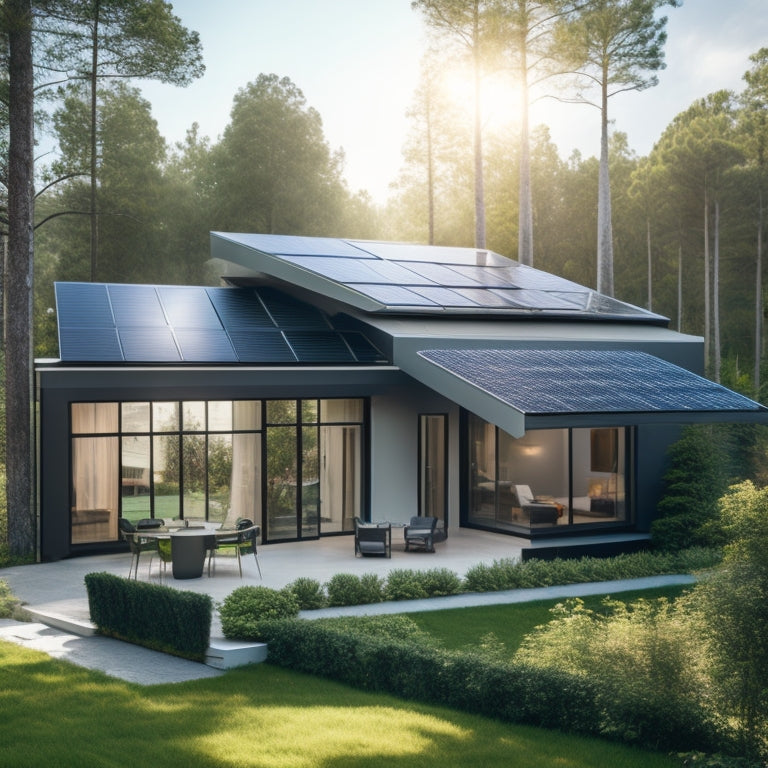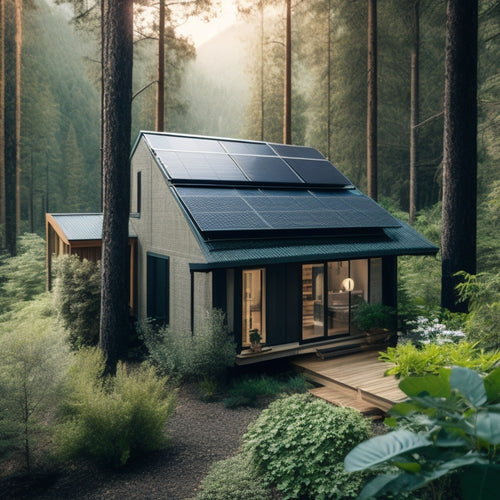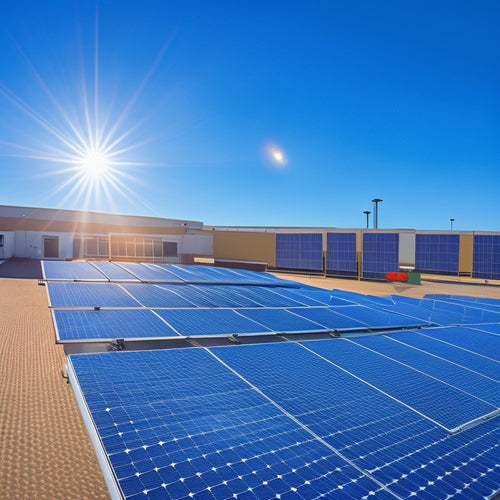
Off Grid Solar System for Home
Share
By installing an off-grid solar system for your home, you'll eliminate reliance on traditional power grids and fossil fuels, embracing a sustainable lifestyle. You'll utilize renewable energy, reducing your carbon footprint and contributing to a cleaner environment. With energy storage solutions, you'll guarantee power availability during low generation periods, achieving energy independence. As you consider this option, you'll want to assess your energy demands, optimize energy production with techniques like Maximum Power Point Tracking, and select higher efficiency solar panels to maximize power output. Now, you're one step closer to revealing the full potential of off-grid solar systems for your home.
The Essentials
- Off-grid solar systems for homes eliminate reliance on traditional power grids, supporting sustainable living and reducing fossil fuel reliance.
- Energy storage solutions ensure power availability during low generation periods, allowing for energy independence and minimizing utility bills.
- Proper solar panel orientation, placement, and optimization techniques like MPPT maximize energy harvesting and production efficiency.
- Accurate assessment of daily energy usage patterns and appliance requirements is crucial for determining the capacity of the off-grid solar system.
- Higher efficiency solar panels and quality wiring/connectors enhance overall system performance, minimizing energy losses and ensuring a stable power supply.
Energy Independence Matters Most
When you opt for an off-grid solar system, you're choosing energy independence, which means you're no longer reliant on traditional power grids.
This independence is vital because it allows you to utilize renewable energy sources, reducing your carbon footprint and contributing to a cleaner environment.
Furthermore, with an off-grid solar system, you can break free from the constraints of traditional grid-based energy and tap into the power of the sun for your home or business.
Renewable Energy Sources
By tapping into renewable energy sources, you're taking a significant step towards breaking free from the grid and gaining control over your energy needs. This shift towards energy independence is vital in the modern era, where reliance on fossil fuels is no longer sustainable.
| Renewable Energy Source | Advantages | Challenges |
|---|---|---|
| Solar Energy | Zero emissions, abundant resource, solar incentives | Intermittent energy supply, high upfront cost |
| Wind Energy | Low operating cost, scalable | Noise pollution, visual impact |
| Hydro Energy | High energy conversion rate, reliable | Dependent on water resources, high upfront cost |
When you opt for renewable energy sources, you're not only reducing your environmental impact but also promoting sustainable practices. Energy storage solutions like batteries guarantee a steady supply of power, even when the sun isn't shining or the wind isn't blowing. With grid alternatives like community solar and net metering, you can even sell excess energy back to the grid and offset your energy costs. By investing in solar technology and energy conservation, you're taking a significant step towards a cleaner, more independent future.
Power Without Pollution
You've made a significant step towards energy independence by tapping into renewable energy sources.
Now, you're reaping the benefits of power without pollution, an essential aspect of sustainable living. Clean energy from the sun reduces your reliance on fossil fuels, decreasing greenhouse gas emissions and mitigating climate change.
With an off-grid solar system, you're producing electricity without harming the environment, ensuring a healthier planet for future generations. By opting for a well-designed solar system, you're also minimizing energy waste by optimizing energy storage and consumption Energy Storage Solutions, allowing you to make the most of your renewable resources.
By utilizing solar energy, you're also minimizing air pollution. Traditional power plants emit toxic gases, contributing to respiratory issues and other health problems. In contrast, solar power generates electricity silently and cleanly, preserving air quality and public health.
Additionally, solar energy reduces water pollution, as it doesn't require water to operate, unlike conventional power plants.
Your decision to adopt clean energy reflects your commitment to sustainable living.
By choosing an off-grid solar system, you're not only reducing your carbon footprint but also promoting a cleaner, healthier environment.
Enjoy the freedom that comes with energy independence, knowing you're making a positive impact on the planet.
Zero Utility Bills
You'll eliminate waste electricity and reduce your reliance on the grid with an off-grid solar system, resulting in zero waste electricity.
By investing in a solar panel battery system renewable energy system costs, you can greatly reduce your upfront costs and still achieve energy independence.
Additionally, with the advancement of solar power systems with battery storage, you can now store excess energy generated during the day for use at night or during power outages.
By generating your own power, you'll greatly lower your power expenses, freeing up more of your budget for other necessities.
With an off-grid solar system, you can expect to pay little to nothing in utility bills, depending on the size of your system and your energy needs.
Zero Waste Electricity
Your rooftop solar array hums along, silently generating electricity as the sun shines down. This means you're producing clean, renewable energy, reducing your carbon footprint and contributing to sustainable living.
As you utilize the power of the sun, you're embracing eco-friendly practices that benefit the environment.
With zero waste electricity, you're not only saving money but also reducing your reliance on the grid. Your off-grid solar system allows you to generate power independently, without contributing to the pollution and waste associated with traditional energy sources.
This independence gives you freedom from the constraints of utility bills and the uncertainty of energy prices.
As you enjoy the benefits of zero waste electricity, you're also doing your part to reduce greenhouse gas emissions and promote a cleaner, healthier environment.
With your rooftop solar array, you're taking a significant step towards a more sustainable future, where energy production and consumption are in harmony with nature.
Lower Power Expenses
How much would you save if you didn't have to pay for electricity? With an off-grid solar system, you'd eliminate utility bills, reducing your financial burden. Let's break down the cost savings:
| Category | Traditional Grid | Off-Grid Solar |
|---|---|---|
| Monthly Electricity | $150 | $0 |
| Long-term Investment | N/A | $15,000 (installation expenses) |
| Maintenance Costs | $100/year | $50/year |
| Financial Incentives | N/A | $3,000 (solar rebates) + $2,000 (tax credits) |
Maximum Power Point Tracking
You'll want to guarantee your off-grid solar system optimizes energy harvesting through Maximum Power Point Tracking (MPPT), which enables your system to extract the maximum possible power from your solar panels.
By leveraging solar battery storage and other state-of-the-art technologies, you can further enhance the efficiency of your off-grid solar system.
MPPT is vital since solar panels don't always operate at their maximum power output due to varying temperatures and irradiance levels.
Efficient Energy Harvesting
Maximum power point tracking (MPPT) is an important component of an off-grid solar system, as it guarantees that the solar panels operate at their maximum potential, even under varying environmental conditions.
By incorporating MPPT, you make certain that your solar panels produce the maximum amount of energy possible, regardless of changes in temperature, cloud cover, or other weather considerations. This is vital for efficient energy harvesting, as it enables you to generate the most power from your solar panel placement.
When selecting an inverter, look for one with built-in MPPT capabilities to optimize energy production. Additionally, consider battery storage solutions that can store excess energy generated during the day for use at night or during periods of low sunlight.
Proper system sizing, maintenance practices, and energy monitoring also play a significant role in maximizing energy harvesting. By considering these factors and taking advantage of government incentives, you can minimize installation costs and enjoy the freedom that comes with relying on renewable energy.
Optimizing Solar Output
Maximizing Solar Output
In tandem with environmental conditions, the voltage and current output of solar panels fluctuate, making it crucial to enhance their performance. To maximize energy production, you need to guarantee your solar panels operate at their maximum power point (MPP). This is where maximum power point tracking (MPPT) comes in. MPPT is a technique that continuously monitors the output of your solar panels and adjusts the input voltage to the inverter to boost energy production.
You can further increase solar output by paying attention to solar orientation and panel placement. Proper alignment of your solar panels with the sun's path can increase energy production by up to 40%.
Additionally, strategic panel placement can minimize shading and reduce energy losses. By combining MPPT with peak solar orientation and panel placement, you can assure your off-grid solar system for home operates at its maximum potential, providing you with the freedom and independence you desire.
Assess Your Energy Demands
You need to understand your daily energy usage patterns to determine the required capacity of your off-grid solar system. This involves identifying the appliances you'll be powering, their individual power requirements, and the duration of usage.
For instance, consider the energy demands of residential solar panels and how they can impact your overall energy needs. Additionally, think about the role of energy storage units in ensuring a stable power supply.
Daily Energy Usage Patterns
Your household's daily energy usage patterns play a critical role in determining the size and configuration of your off-grid solar system. Understanding your energy consumption habits is vital to designing a system that meets your needs.
You'll want to identify your usage trends, including peak hours, to guarantee your system can handle the demand.
Your lifestyle has a significant impact on your energy consumption. For instance, if you work from home, your energy usage will be higher during the day. Seasonal variations, like increased heating or cooling needs, also affect your energy demands.
By understanding your household habits, you can identify opportunities for energy efficiency and reduce your grid dependency.
To accurately assess your energy needs, you'll need to monitor your usage. This will help you determine your required solar capacity.
You can use tools like energy meters or monitoring software to track your energy consumption. By doing so, you'll be able to design an off-grid solar system that meets your unique needs, providing you with the freedom and independence you desire.
Appliance Power Requirements
Appliance Power Requirements (Evaluate Your Energy Demands)
Each appliance in your home has a specific power requirement, and understanding these demands is crucial to designing an off-grid solar system that can accommodate your energy needs. You'll need to determine the wattage and voltage requirements of each appliance to guarantee your solar system can handle the load.
| Appliance | Wattage | Voltage |
|---|---|---|
| Refrigerator | 150W | 120V AC |
| Laptop | 65W | 19V DC |
| LED Light | 9W | 12V DC |
Once you've compiled a list of your appliances and their power requirements, you can begin to deliberate solar inverter options that can efficiently convert DC power from your solar panels to AC power for your appliances. Additionally, you'll need to contemplate battery storage solutions to store excess energy generated during the day for use at night or during periods of low sunlight. By accurately evaluating your energy demands, you can design an off-grid solar system that provides reliable, sustainable power for your home.
Higher Efficiency Solar Panels
You'll want to evaluate solar panels with higher efficiencies to maximize your system's power output.
Higher efficiency solar panels can generate more power per unit area, resulting in a smaller system footprint and reduced installation costs.
Maximum Power Output
Higher efficiency solar panels are essential for maximizing power output in an off-grid solar system. When selecting solar panels, you want to guarantee you're getting the most energy possible from the sun. This is particularly important when living off the grid, as you may not have access to reliable grid power.
To maximize power output, consider the following factors:
| Factor | Impact on Power Output |
|---|---|
| Efficiency Rating | Higher ratings (e.g., 20%) produce more power per unit area |
| Panel Size | Larger panels (e.g., 400W) generate more power than smaller ones (e.g., 300W) |
| Cell Type | Monocrystalline cells tend to be more efficient than polycrystalline cells |
| Temperature Coefficient | Lower coefficients (e.g., -0.3%) indicate less power loss due to heat |
| Wiring and Connectors | High-quality wiring and connectors minimize energy losses during transmission |
Frequently Asked Questions
Can I Use a Generator as a Backup Power Source?
You can use a generator as a backup power source, but you'll need to verify it meets your power output requirements; research generator specifications, calculating your energy needs, to confirm seamless changes when the grid goes down.
How Do I Clean and Maintain My Solar Panels?
You're the captain of your own energy ship, steering towards sustainability. Regularly cleaning your solar panels is essential; use a soft-bristled brush, mild soap, and distilled water to remove debris, ensuring maximum energy harvesting. Maintenance tips: inspect for damage, tighten connections, and monitor performance.
Are Off-Grid Solar Systems Suitable for Small Homes?
You're wondering if off-grid systems are suitable for small homes. Absolutely, they're a great fit! By optimizing energy efficiency and incorporating battery storage, you'll enjoy reliable power, reduced energy costs, and the freedom to live life on your own terms.
Can I Add More Solar Panels to My Existing System?
"Measure twice, cut once" - carefully assess your existing system's capacity before adding more solar panels, ensuring compatibility and considering system size to avoid overload, then you'll be free to utilize more energy and live off the grid.
Do Off-Grid Solar Systems Work During Power Outages?
You'll stay powered during outages with an off-grid system, thanks to energy independence and battery storage. When the grid fails, your system automatically switches to battery power, ensuring you've got electricity when you need it most.
Final Thoughts
You're on the cusp of a revolution - breaking free from the shackles of utility bills and embracing energy independence like never before! With an off-grid solar system, you'll be basking in the glory of zero utility bills, maximum power point tracking, and higher efficiency solar panels. Your energy demands will be assessed to the tee, ensuring a customized solution that's as unique as you are. Imagine it - limitless power, unbridled freedom, and a carbon footprint that's virtually nonexistent. The future is here, and it's shining brighter than ever!
Related Posts
-

Key Components of a Reliable Emergency Power Supply System
A reliable emergency power supply system requires several key components. You need proven performance metrics to guar...
-

Off Grid Solar Batteries
As you shift to off-grid living, you'll rely on high-performance solar batteries to store excess energy generated by ...
-

Essential Solar Panel Mounts for Commercial Properties
When it comes to essential solar panel mounts for your commercial property, durability and wind resistance are key fa...


